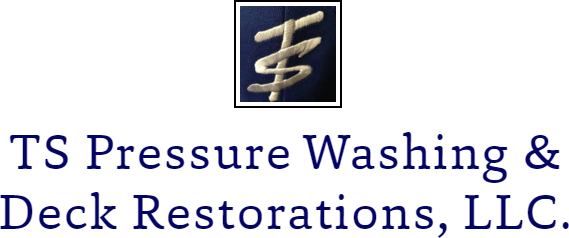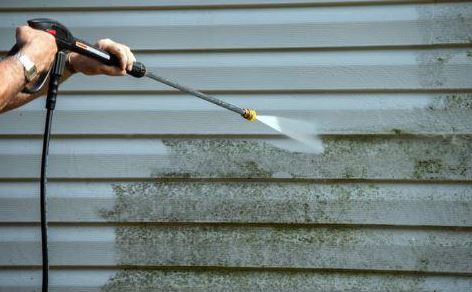DC, Maryland and Virginia
Top 5 Myths About Pressure Washing
Pressure washing is a widely embraced method for cleaning surfaces, but it comes with its fair share of myths. In this comprehensive exploration, we've debunked five common misconceptions, shedding light on the realities of pressure washing.
Myth 1: Pressure Washing Damages Surfaces
One of the most persistent myths surrounding pressure washing is the belief that it can cause damage to various surfaces. However, when executed properly, pressure washing is a safe and effective method for cleaning. The key lies in understanding the appropriate pressure settings and using the right equipment for different surfaces.
Many homeowners fear that pressure washing can strip paint, gouge wood, or damage delicate surfaces. This concern is valid if the equipment is mishandled or set at too high a pressure. The truth is that pressure washing, when done by a trained professional or a knowledgeable homeowner, can effectively remove dirt, mold, mildew, and other contaminants without causing harm.
For example, a wooden deck may benefit from a lower pressure setting to avoid splintering, while concrete driveways can withstand higher pressure for more thorough cleaning. Understanding the specific needs of each surface is crucial in dispelling the myth that pressure washing universally damages surfaces.
In essence, pressure washing, when performed responsibly, enhances the longevity and appearance of surfaces. By debunking the myth of inherent damage, homeowners can confidently utilize pressure washing as a valuable tool in their maintenance arsenal.
Myth 2: All Pressure Washers Are the Same
Another common misconception is that all pressure washers are created equal. In reality, there's a wide range of pressure washers designed for different purposes, from residential to commercial use. Understanding these distinctions is vital for achieving optimal results.
Residential pressure washers are generally less powerful and are suitable for tasks like cleaning cars, small decks, and patios. On the other hand, commercial-grade pressure washers deliver higher pressure and are designed for more extensive and frequent use, making them ideal for larger properties, industrial facilities, and construction sites.
The myth that any pressure washer will do the job overlooks the importance of selecting the right equipment for the task at hand. Using a pressure washer with too much power for a delicate surface can result in unnecessary damage, while using an underpowered machine for a large project may yield unsatisfactory results. By debunking this myth, homeowners and professionals alike can make informed decisions when choosing the appropriate pressure washer for their specific needs.
Myth 3: Pressure Washing Is Only for Exteriors
Contrary to popular belief, pressure washing is not limited to exterior surfaces. While it's commonly associated with cleaning the outside of homes, driveways, and sidewalks, pressure washing can be a versatile solution for a variety of cleaning needs, including interior spaces.
Pressure washing is highly effective for cleaning surfaces like concrete floors, tile, and grout in garages, basements, and even kitchens. The forceful stream of water can remove built-up grime, oil stains, and other stubborn contaminants. Additionally, pressure washing is an excellent way to revitalize decks, fences, and other outdoor structures, not just limited to the building's exterior.
Dispelling the myth that pressure washing is exclusively an outdoor cleaning method opens up a world of possibilities for homeowners and businesses. By recognizing its versatility, individuals can leverage pressure washing to maintain both the aesthetic appeal and cleanliness of various surfaces within and around their properties.
Myth 4: Pressure Washing Can Be Done by Anyone
A prevalent misconception surrounding pressure washing is the belief that it's a simple do-it-yourself task that anyone can undertake without specialized knowledge or training. While it might seem straightforward, mishandling pressure washing equipment can lead to unintended consequences, including damage to surfaces and personal injury.
Pressure washers, especially those with higher pressure settings, can be powerful tools that require a certain level of expertise to operate safely. Novice users may not be familiar with the nuances of adjusting pressure levels based on different surfaces, leading to potential damage. Moreover, using incorrect nozzles or holding the nozzle too close to a surface can result in gouges, splintering, or other forms of harm.
To debunk this myth, it's essential to emphasize the importance of proper training and understanding the intricacies of pressure washing. Professional pressure washing services often have experienced technicians who know how to handle the equipment effectively and can assess the specific needs of each job to avoid unnecessary damage.
While some smaller, less complex pressure washing tasks may be suitable for homeowners to tackle on their own, larger or more delicate projects often require the expertise of trained professionals. By acknowledging the potential risks associated with improper use of pressure washing equipment, individuals can make informed decisions about whether to undertake a task themselves or seek professional assistance.
Myth 5: Pressure Washing Is the Same as Power Washing
The misconception that pressure washing and power washing are interchangeable terms is widespread. In reality, while both methods involve using a forceful stream of water to clean surfaces, there is a fundamental difference between the two: the addition of heat in power washing.
Pressure washing utilizes cold water at high pressure to remove dirt, grime, and other contaminants. On the other hand, power washing incorporates the use of hot water, which can be particularly effective in removing oil stains, grease, and certain types of mold and mildew. The application of heat enhances the cleaning power, making power washing a preferred method for more challenging and stubborn stains.
Understanding this difference is crucial because it influences the choice of method for specific cleaning tasks. Pressure washing is excellent for routine cleaning and maintenance, while power washing is a preferred option for heavy-duty cleaning, particularly on surfaces where the application of heat can make a significant difference.
Here's a great article from Homes & Gardens to read. Click here.
By dispelling the myth that pressure washing and power washing are the same, individuals can make more informed decisions about which method is best suited for their cleaning needs. Recognizing the nuances between the two allows for more effective and efficient cleaning results.




Share On: